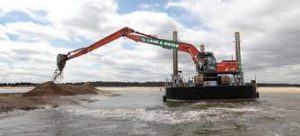 Dredging is the excavation of material from a water environment. The work is typically carried out by a specialist floating plant known as a dredger.
Dredging is the excavation of material from a water environment. The work is typically carried out by a specialist floating plant known as a dredger.
Maintenance: to deepen channels or harbors which silt up over time, usually with a trailing suction hopper dredge. Also to remove sand and gravel for construction uses, or for sale as beach sand.
Providing expert marine excavation and dredging services requires years of experience, a large fleet of modern equipment, and a team of innovative experts committed to superior customer service. Javeler has all of these things – and more.
Observes, inspects, and provides construction management services for projects that involve coastal restoration and dredging to ensure compliance with plans and specifications. Checks and prepares tugboat, barge, and dredge for dredging operations; communicates with dredge captain and dredge operator to coordinate dredge movements.
Dredging is the excavation of material from a water environment. This can be done for a number of reasons; to improve navigation and create deeper waters, for example; or to remove seabed debris and to recover mineral deposits or marine life with commercial value. The excavation is usually carried out by specialist floating plants known as dredgers.
Some forms of dredging can have significant environmental impacts. This can include the disturbance of marine sediments which can lead to both short and long term water pollution, destroy important seabed ecosystems and release legacy human-sourced toxins captured in the sediment.
Best Gulf and Bay Dredging in St.Petersburg offers comprehensive dredging services from engineering and permitting procedures to the removal of dredge spoils and proper disposal in accordance with regulations. The company’s in-water operator ensures that the dredging process is completed as safely as possible, without impacting marine wildlife or fisheries.
Dredging involves excavating material from a body of water. It can be done for many reasons, including improving navigational channels, creating berthing spaces for boats and ships, and reshaping land or shorelines. The material removed is transported to a predetermined location for disposal.
Capital dredging is carried out to create a new harbor, berth or waterway or to deepen existing facilities. This work is typically undertaken by a cutter suction dredge or large trailing suction hopper dredge.
Maintenance dredging removes non-natural material from the bottom of a river or canal to maintain their depth. It is also used by law enforcement agencies to recover evidence or bodies from the seabed. Dredging can have negative environmental impacts, causing short and long-term water pollution, destroying important seabed ecosystems, and releasing legacy human-sourced toxins into the environment.
Dredging involves digging up and removing unwanted marine sediments from riverbeds, harbors and canals. It can also be used to create a deeper seabed or remove old shipwrecks, oil tankers or other sunken debris.
Dredgers can be shore-based, brought to a location based on barges or built into purpose-built vessels. They can either be suction-type, which operate like vacuum cleaners, or drag type which use large chains to move along the seabed pulling in material as they go.
This process can have significant environmental impacts, including disturbing important seabed ecosystems and releasing legacy human-sourced toxins captured in the marine sediment. To minimize these impacts, it is essential to work with an experienced and qualified dredging company. They will handle all aspects of dredging, from engineering and permitting procedures to transporting dredge spoils to pre-approved, offsite locations for safe disposal.
The best way to work with a contractor is to be honest. This can help prevent problems down the line, as the contractor will know if something is wrong and can correct it quickly. Additionally, being honest can also improve the relationship between the contractor and client. A contractor who is not honest will likely not get the job again, which can damage the reputation of the company.
Several universities in Florida offer marine science degrees, including Florida Atlantic University (FAU) with a B.S. in ocean engineering and the University of Miami with a M.S. and Ph.D. in oceanography.